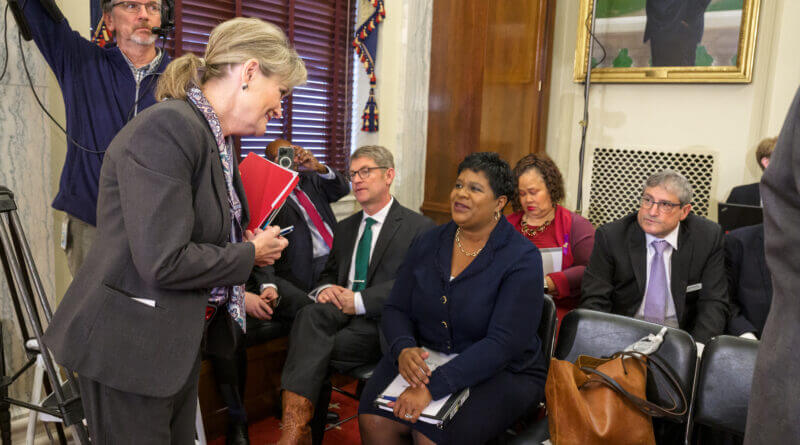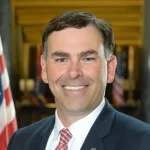Hyde-Smith to seek federal help to fill rural veterinarian need
Photo: Sen. Cindy Hyde-Smith speaks to Alcorn State University Dr. Felecia Nave. (Official U.S. Senate photo by Renee Bouchard)
U.S. Senator Cindy Hyde-Smith (R-Miss.), as part of congressional preparation for writing the 2023 Farm Bill, today sought commitments to find solutions to a growing shortage of large animal veterinarians in rural areas.
Hyde-Smith used a Senate Agriculture Committee hearing titled, “Farm Bill 2023: Research Programs,” to highlight the need for the new Farm Bill to include better incentives to recruit more veterinarians to serve in rural areas. The overall hearing addressed U.S. Department of Agriculture (USDA) research, extension, and education programs, and included testimony from Alcorn State University President Dr. Felecia M. Nave.
“I want to talk about rural veterinary medicine. In Mississippi we have a tremendous shortage, and across the country, that threatens the long-term viability of our livestock industries. We have counties in Mississippi that don’t even have a large animal veterinarian, and that’s really what we’re hearing across the entire country,” Hyde-Smith told Dr. Chavonda Jacobs-Young, Under Secretary for Research, Education, and Economics.
“Our nation’s food security and economic security are put at risk without sufficient veterinary oversight to ensure the health of animals in the food supply chain, and the proper federal inspection of meat, poultry, and catfish processing,” the Senator said.
Hyde-Smith said the USDA National Institute of Food and Agriculture (NIFA)-administered Veterinary Medicine Loan Repayment Program is diminished by the federal taxes on awards intended to help recruit veterinarians to serve in rural communities.
“There are still critical veterinary shortages across rural America. One reason for this is that these awards from NIFA are subject to a federal withholding tax, meaning that 37 percent of the dollars appropriated to this program go right back to the Treasury, instead of toward the educational debt of rural veterinarians,” said Hyde-Smith, a cosponsor of the Veterinary Medicine Loan Repayment Program Enhancement Act (S.2215).
“Without this tax, we could better address these shortage issues by helping more veterinarians practice where it is desperately needed,” she said.
Jacobs-Young, who mentioned visits to Mississippi State University and Alcorn State University, concurred with Hyde-Smith on the need for more large animal veterinarians and agreed to work with the Senator on the issue. The Under Secretary noted that incentives should also be used to diversify the pool of students in large animal medicine, many of whom are also needed to work in USDA agencies.
“So, the incentives are great. Programs like the NIFA-led program are great,” Jacobs-Young said. “We’ve also recognized an imperative to diversify our veterinary programs. I toured and talked with some of the students at President Nave’s university at Alcorn. The students are interested in animal science and veterinary science. How do we encourage them and bridge a way for them to go into vet programs?”
The Tuesday hearing was the latest in a series of hearings leading up to the development of a new five-year farm bill to authorize USDA agricultural, rural development, and nutrition programs. In November, the committee reviewed USDA rural development and energy programs.






